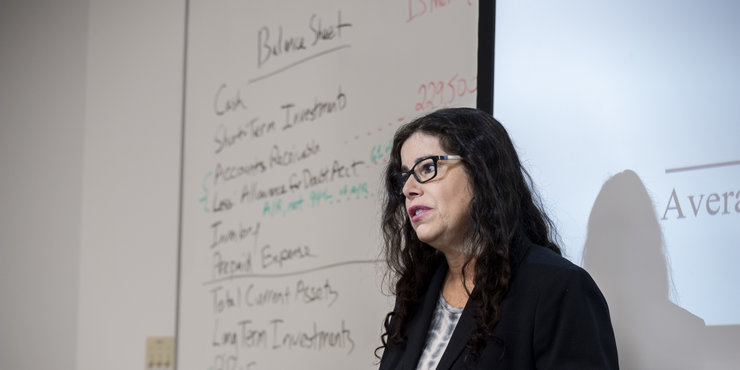What Are the Different Types of Accountants?
Despite what many believe, an accounting career can involve far more diverse work than adding piles of receipts or dealing with tax returns all day. If filling out tax forms doesn't appeal to you, we have some great news: the world of accounting has expanded—pursuing a future as an accountant doesn't mean you'll do nothing but calculate people's deductions every year (although managing tax returns is still a very important role for most accountant positions). This profession continues to grow, and it provides interested individuals the opportunity to work in exciting industries, each with its own earning potential. Take a look at 10 types of accountants who focus on more than taxes.
Staff Accountant
A staff accountant is a great option for anyone who has a bachelor's degree in accounting and who wants a variety of work. Staff accountants generally report to a CPA, creating financial reports and analyzing financial data. Depending on the size of the organization, a staff accountant may also be tasked with both accounts payable and accounts receivable management, creating a budget, and reconciling bank accounts. Generally, staff accountants also work to ensure that the organization is compliant with financial regulations that affect their particular industry. As a staff accountant gets more experience in an industry, they may also be called on to create financial forecasts.
Recommended college coursework includes personal financial accounting, corporate taxation, risk analysis, and business law. According to PayScale.com, the average salary of a staff accountant is $50,099. They may also be eligible for bonuses and profit sharing.
Certified Public Accountant
Although certified public accountants (CPAs) are best known for their work on both federal and state taxes, they manage much more than that. In many industries, a CPA may be hired to manage the organization's staff accountants. Because a CPA has an extensive, focused education that required the passage of specialized exams, they're often treated as an organization's financial advisor. They may also oversee audits or reviews. CPAs may also specialize in certain fields, such as forensic accounting (which will be discussed below).
Recommended college coursework includes general accounting, computerized accounting, cost accounting, taxation, business statistics, and financial management. It is important to remember that a CPA is required to pass a licensing exam in addition to finishing their college coursework. According to PayScale.com, the average salary of a CPA is $65,397. They may be eligible for bonuses and profit sharing. CPAs who specialize in certain areas or who work as expert witnesses may, of course, earn substantially more money.
Investment Accountant
Another excellent accounting career option outside of the tax realm is that of an investment accountant. An investment accountant works in the financial industry, usually with an investment brokerage or asset management firm. In addition to knowing the basics of accounting (including how certain assets and investments may impact a client's taxes), they must also be knowledgeable about the investment opportunities that the organization offers. It is often the responsibility of the investment accountant to ensure that the organization is in compliance with state and federal regulations that impact the industry. They may also help the organization improve its financial strategy.
Individuals interested in becoming an investment accountant would benefit from taking economics, financial management, financial accounting, cost accounting, auditing, corporate accounting, and taxation. It's also important to review the requirements in the state where they wish to work to learn whether they will need a specific license because they are working with or for an investment company. Potential required licenses are overseen by the Financial Industry Regulatory Authority, and include Series 6, Series 7, Series 63, Series 65, and Series 66. These licenses would only be needed if the investment accountant actually packaged and sold certain financial products. According to PayScale.com, the average salary for an investment accountant is $61,918. They may also be eligible for bonuses and profit sharing.

Project Accountants
Project accountants are hired to work on specific projects. Depending on the organization for which they are hired, they may be a long-term employee or a contractor brought in specifically to manage one specific objective. Of course, a great working relationship for a single project could also result in both repeat work and referrals. Project accountants oversee anything that might be involved with the effort. This includes, but may not be limited to, preparing invoices, collecting on invoices, approving expenses, approving billable hours provided by others, planning and maintaining project budgets, and helping ensure that the project is completed by the deadline.
Individuals interested in becoming a project accountant would benefit by taking interpersonal communications, human resources, cost accounting, auditing, taxation, corporate accounting, risk management, and managerial accounting. If the project accountant plans to open their own business, they will also benefit from taking courses related to running a business. According to PayScale.com, the average salary of a project accountant is $56,857. They may also be eligible for bonuses.
Cost Accountant
A cost accountant is similar to a project accountant in that their goal is to help ensure that cost efficiency is met. However, a cost accountant isn't usually hired on a per-project basis, but rather by organizations that require assistance in managing their supply chain profitability and their budgets. Cost accountants analyze labor costs, the cost of materials, the costs associated with shipping, production costs, and other costs related to the supply chain. The purpose of their efforts is to identify areas that can be made more efficient.
Individuals interested in becoming a cost accountant would benefit from taking cost accounting, auditing, corporate accounting, risk management, supply chain management, and managerial accounting. According to PayScale.com, the average salary of a cost accountant is $55,710. They may also be eligible for profit sharing and bonuses.
Management Accountant
A management accountant analyzes the financial standing of an organization and how it could impact the company. The management account may also then provide specific advice on how to improve the organization's financial health. Management accountants are directly involving in budgeting, external financial reporting, risk management, and performing profitability analyses. It is also important for a management accountant to have the interpersonal and professional skills required to present their information to executives in a manner that is easily understandable.
Individuals interested in becoming a management accountant should study risk management, managerial accounting, cost accounting, auditing, corporate finance, taxation, and interpersonal communications. After completing a bachelor's degree, individuals must then take and pass the certified management accountant (CMA) exam. According to PayScale.com, the average salary for a management accounting is $59,405. They may also be eligible for bonuses and profit sharing.
Forensic Accountant
A forensic accountant analyzes financial records to determine whether they contain any errors, omissions, or fraud, as well as to ensure that the records are in compliance with both state and federal laws. Forensic accountants may work for firms that specialize in this particular type of accountancy service, be self-employed, work in the legal industry, or work for the government. In addition to reviewing financial records to ensure the information is accurate, forensic accountants must do additional research and investigation related to the information presented. Those with this specialization are in high demand to serve as expert witnesses in litigation, as they are skilled at unravelling and explaining complex financial issues and large sums of money.
Individuals interested in becoming a forensic accountant would benefit from taking auditing, cost accounting, risk management, forensic accounting, managerial accounting, and taxation. Most forensic accountants go on to become CPAs or to obtain their certified fraud examiner (CFE) credentials. According to PayScale.com, the average salary of a forensic accountant is $66,311. Experience, as well as obtaining a CPA or CFE, increases the salary for most forensic accountants.

Auditor
Auditors ensure that organizations are correctly recording their financial information. Many industries require that organizations operating within them perform at least one external audit, conducted by someone who is not an employee, each year. Auditors review financial statements, account books, accounting systems, and fiscal records to ensure that the business is complying with all applicable financial regulations. They also generally provide recommendations to the organization if there are issues that must be resolved or recommendations to help prevent future issues.
Individuals interested in becoming an auditor would want to take courses in auditing, risk management, forensic accounting, managerial accounting, corporate finance, and corporate accounting. They may also wish to seek certification as an auditor after completing their degree program. According to PayScale.com, the average salary of an auditor is $55,748.
Financial Advisor
Individuals looking to do something different with their accounting degree may find a fulfilling and successful career as a financial advisor. Financial advisors provide investment and financial-planning services to individuals as well as to businesses. The goal of a financial advisor is that of a CPA: their goal is to improve their client's financial standing. Financial advisors talk with their clients, create plans that assists clients in meeting their financial goals, and follows up with them over time to adjust plans as needed. Financial advisors who work for businesses will look at the company's financial statements and other information to determine how best to improve the company's financial standing.
Individuals interested in becoming a financial advisor would want to study risk management, taxation, supply chain management, financial management, corporate finance, and managerial accounting. They may also be required to obtain specific licenses to work as a financial advisor. According to PayScale.com, the average salary of a financial advisor is $58,078. They may also be eligible to receive commissions and bonuses.
Financial Consultant
A financial consultant is an individual who is skilled in finance and who can help individuals or organizations make sound financial decisions. A financial consultant may be self-employed, be hired by a particular organization because of their skill set, or work for a company that provides financial consulting. They may prepare and review financial reports, analyze financial statements, and help ensure compliance with regulations where necessary.
Taxation, risk management, supply chain management, cost management, managerial accounting, and auditing are courses useful to future financial consultants. According to PayScale.com, the average salary of a financial consultant is $67,099. They may also be eligible for bonuses.
Count on Your Future with a Bachelor's in Accounting from Seaver College
A bachelor's in accounting opens many doors to a successful career, but a useful degree is just one of the many benefits of studying at Seaver College. We help our students get ready for the real world by providing hands-on opportunities, career networking, and internships. If you're ready to explore how a bachelor's in accounting could change your life, get in touch with us!